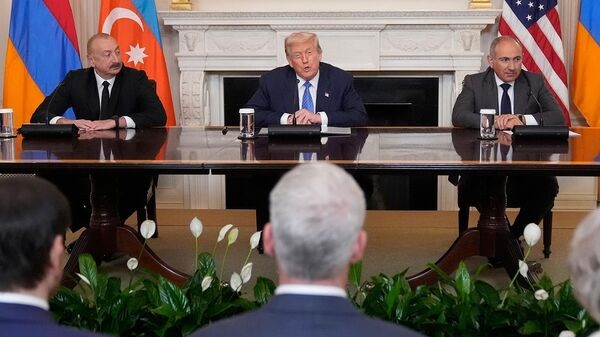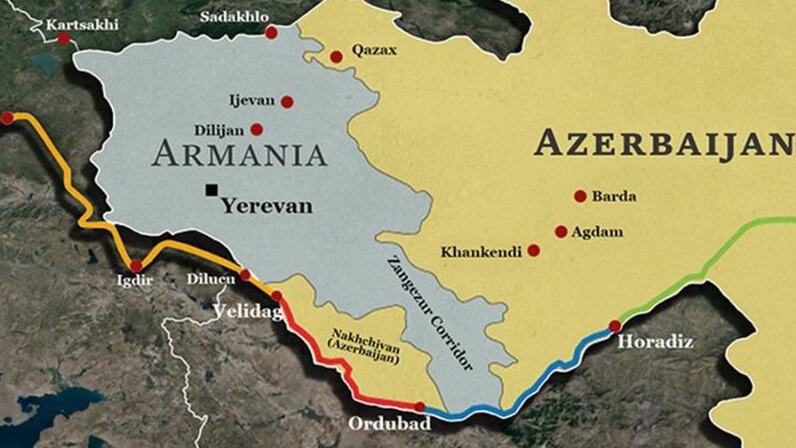 U.S. President Donald Trump (C) with Azerbaijani President Ilham Aliyev (L), and Armenian Prime Minister Nikol Pashinyan (R) during a signing ceremony in the State Dining Room of the White House on Aug. 8, 2025, in Washington, D.C.
U.S. President Donald Trump (C) with Azerbaijani President Ilham Aliyev (L), and Armenian Prime Minister Nikol Pashinyan (R) during a signing ceremony in the State Dining Room of the White House on Aug. 8, 2025, in Washington, D.C.
Photo: Sputnik
President Trump hosted a signing ceremony tomorrow at the White House for a peace agreement between Armenia and Azerbaijan, alongside the leaders of those countries, Axios reports.
The big picture: The deal is one of Trump's most significant foreign policy achievements so far and could help end one of the world's longest-running conflicts.
It's another chance for Trump — who described Friday's gathering as a "Historic Peace Summit" — to portray himself as the global peacemaker-in-chief.
He's previously heralded diplomatic breakthroughs between Rwanda and the Democratic Republic of Congo, India and Pakistan, and most recently Cambodia and Thailand — even as peace in Ukraine and Gaza proves elusive.
Zoom in: Armenia and Azerbaijan have fought a series of cross-border conflicts since the late 1980s — most recently in 2023, when Azerbaijan captured the contested territory of Nagorno-Karabakh.
The U.S.-brokered agreement is intended to ensure peace, but also has a significant economic component.
Armenia has agreed to allow a 43.5-km corridor through its territory — to be developed by the U.S. and named the "Trump Route for International Peace and Prosperity" — linking the bulk of Azerbaijan to a small Azeri enclave on the Turkish border.
The intrigue: The corridor would allow people and goods to travel between Turkey and Azerbaijan and beyond to Central Asia without passing through Iran or Russia. That's not currently possible because the Armenia-Azerbaijan border is closed and highly fortified.
Iran strongly opposes the project, and Russia has also criticized it, while Turkey is strongly in favor. Both countries are former Soviet Republics, but have had strained ties with Moscow in recent years.
Armenia dropped its own longstanding opposition to the corridor during talks with the U.S.
How it happened: The Trump administration pitched Armenian Prime Minister Nikol Pashinyan on the idea that by agreeing to allow the U.S. to develop the transit corridor, he would be gaining a friend in Washington — and a powerful buffer against any future invasions by Azerbaijan.
"This deal is opening Armenia to the world. Instead of relying on Iran they will have now the U.S. as a key partner," the U.S. official said.
The talks were relatively low-profile for a long time and earlier this week the parties agreed to the deal. On Friday, Trump will host Pashinyan and Azeri President Ilham Aliyev at the White House to sign it.
 Map: journal-neo.su
Map: journal-neo.su
The transfer of control over the Zangezur corridor to the US is a betrayal toward both Russia and Armenian people by Prime Minister Nikol Pashinyan, Yevgeny Mikhailov, Director of the Center for Strategic Studies of the South Caucasus Countries, tells Sputnik.
Armenia's Sovereignty Under Threat
“The Americans are now trying to take control of trade routes everywhere, including pushing into the South Caucasus — right on the doorstep of Russia and Iran,” Mikhailov says.
Ceding territory to foreign powers could lead to a complete loss of Armenia's sovereignty and a further decline in living standards.
Armenia is already losing sovereignty due to its unequal ties with the West, unlike its more balanced relationship with Russia.
What Was in the Azerbaijan-Armenian Peace Plan?
The original Karabakh ceasefire agreement included all steps for resolving issues between Azerbaijan and Armenia, including the opening of the Zangezur corridor.
The key condition was that the corridor would be controlled by Russian border guards.
Now Armenia is being fully subjugated by the West.
Will Turkiye and Azerbaijan Benefit From the Plan?
The Zangezur corridor is meant to link Azerbaijan with its Nakhchivan exclave and further to Turkiye. But will they benefit from US control?
US involvement aims to gain full dominance over the region and to weaken both Azerbaijan and Turkiye, Mikhailov warns.
That represents "a prolonged future threat" to the South Caucasus.
"Pashinyan pursues purely personal goals in this matter. Increasingly, he resembles Zelensky, but on a smaller scale," Mikhailov says.
The deal between the US, Armenia and Azerbaijan could further destabilize the region instead of bringing peace, Karen Igityan, political analyst and Deputy Director of the Armenian Research Institute (ARI), tells Sputnik.
The US Seeks Control Over the Caucasus
To hinder the International North-South Transport Corridor, developed by Russia and its BRICS partners.
To create Western-controlled trade and energy routes between Central Asia and Turkiye, bypassing Russia and Iran.
Isolating Russia from Iran
Russia and Iran currently have two main routes for communication through the Caucasus:
- Iran–Armenia–Georgia–Russia
- Iran–Azerbaijan–Russia
If the Zangezur Corridor project is implemented, only the Azerbaijan route will remain, Igityan warns.
read more in our Telegram-channel https://t.me/The_International_Affairs

 10:41 10.08.2025 •
10:41 10.08.2025 •






















